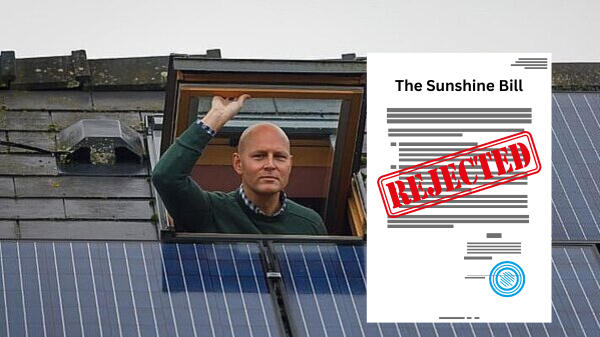In a decision that has sparked widespread discussion, the UK government recently rejected the Sunshine Bill, which aimed to make solar panels mandatory for all new-build homes. The bill proposed that an area equivalent to at least 40% of a new home’s ground floor be fitted with solar panels, a measure that could have significantly boosted renewable energy adoption in the housing sector.
The Sunshine Bill: A Missed Opportunity?
The rejection of the Sunshine Bill raises important questions about the future of sustainable housing in the UK. Without this mandate, developers are not required to integrate solar panels into new-build homes, leaving room for minimal or no installations. This decision could have long-term consequences for homeowners, the housing market, and the UK’s climate goals.
Many advocates of the Sunshine Bill believe it represented a step toward more energy-efficient homes and reduced reliance on fossil fuels. Mandating solar panels would not only lower carbon emissions but also reduce energy bills for homeowners—a win-win for sustainability and affordability.
The Impact on New-Build Homes
The lack of mandatory solar panel requirements places the responsibility of renewable energy adoption squarely on homeowners. Without integration at the construction stage, homeowners may need to retrofit solar panels, a process that is often more expensive and less efficient than installing them during the build.
Additionally, the absence of such a mandate could lead to a continuation of the trend where developers opt for the bare minimum—such as installing just two solar panels per property. This approach not only limits energy savings but also hinders the ability to expand systems for greater energy independence in the future.
Challenges of Peak Export and Low Uptake
One of the concerns raised during the debate around the Sunshine Bill was the issue of peak export. Without proper energy storage solutions, such as solar batteries, excess energy generated by solar panels often goes unused. This is compounded by low uptake from homeowners, many of whom may lack the knowledge or resources to optimize these systems.
Including battery storage as part of the solution could address these challenges, ensuring that the energy generated by solar panels is stored and used effectively. Unfortunately, the Sunshine Bill’s rejection means these critical elements are left unaddressed at a systemic level.
What’s Next for Sustainable Housing?
The rejection of the Sunshine Bill highlights the need for continued advocacy and innovation in the renewable energy space. While the government may not be mandating solar panels on new-build homes, this should not deter developers and homeowners from embracing renewable solutions.
Incentives, education, and voluntary standards could play a vital role in bridging this gap. By designing new-build homes with scalability and renewable energy in mind, stakeholders can still drive meaningful change, even without government mandates.
Conclusion
The Sunshine Bill’s rejection is a setback for those pushing for a greener future, but it also underscores the importance of ongoing dialogue and action. Whether through policy changes, incentives, or increased public awareness, there is still an opportunity to make new-build homes a cornerstone of the UK’s renewable energy strategy.
What are your thoughts on the Sunshine Bill? Was rejecting it the right move, or do you see it as a missed opportunity for sustainable progress? and no matter what the result of the bill, new or older homes are still eligible for solar installation so don’t delay and get in touch with us today!

